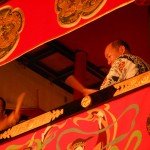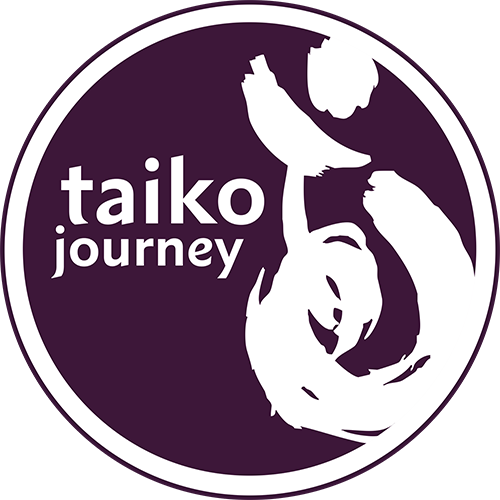Festival, music, food, people, heat, heartbeat, dreams-come-true….and asking the question with a professor at the National Museum of Ethnology…
Gion Matsuri, day after day
Nothing could have prepared me…I had head that there would be lots of people, but I was at  Blackfriars Bridge for New Years Eve, 1999/2000, and that seemed like a local street party compared to the crowds in Kyoto streets this evening.
Blackfriars Bridge for New Years Eve, 1999/2000, and that seemed like a local street party compared to the crowds in Kyoto streets this evening.
Everywhere I looked vast wide streets studded with towering floats, adorned with strings of lit lanterns, and a constant moving mass of people. But there was no panic, no edginess, no shouting or pushing…officials handed out fans to distract us from the clingy heat, directed the traffic of bodies, and it all worked. We stopped for street food, and refreshments (has a cold beer in a plastic cup ever tasted so good?) and listened and watched as the floats generated music that I had only read about. Flutes, metal percussion, and taiko wound their way into our ears, it was hot down here, but must have been sweltering up there, bodies clustered together, perched on the edges and energy exerted to produce music that gave spirit to the crowds down below…As the bodies clustered together, perched on the edges of the lofty cabin part of the float, the energy exerted to produce that music must have made the heat unbearable as it was hot enough down on street level, but it gave spirit to the crowds down below as they almost battled out who was going to play for the longest.
As Gion Matsuri intensified over the next few days, we immersed ourselves in the spirit that charged along the streets like blood  through veins. Processions of musicians, horses, chanting crowds and beautiful moments like turning around and finding myself standing next to a ‘Geiko’ serving beer to the thirsty festival participants was all part of the matsuri experience. It seemed like I was standing in a Japanese dream made of a thriving palette of bright colours, delicious food and music; a deep rooted culture tolerant of people like me wanting to experience it’s delights – it was a dream that I would never have considered before discovering taiko.
through veins. Processions of musicians, horses, chanting crowds and beautiful moments like turning around and finding myself standing next to a ‘Geiko’ serving beer to the thirsty festival participants was all part of the matsuri experience. It seemed like I was standing in a Japanese dream made of a thriving palette of bright colours, delicious food and music; a deep rooted culture tolerant of people like me wanting to experience it’s delights – it was a dream that I would never have considered before discovering taiko.
I’ll never forget being there, hotter than I have ever been, I kept having to remind myself that I was there, it was happening for real…a moment I had waited for, that Yoshihiko Miyamoto had told me of almost a year ago…subarashii.
‘Why would people play taiko without a Japanese community?’
When Jonathan Kirby and I met Yoshitaka Terada in the truly wonderful Museum of Ethnology, we sat together and over lunch explored the possible irony that the absence of cultural identity within UK taiko actually reveals the essence of why people play taiko globally, despite its seemingly cultural identity. Essentially we discussed why people play taiko – one of my favourite conversations. It started because Yoshitaka Terada, having studied and written papers about diverse taiko groups in Japan and North America, had always assumed that there was an established Japanese community that started taiko wherever it occurred in the world.
However, taiko in the UK is distinctly devoid of people with Japanese ancestors. Although many taiko groups in the UK owe their existence to someone who had spent time in Japan learning taiko and bringing it back to the UK to share it with others, we talked about the “taiko-ness” of taiko being as important as any “Japanese-ness” of taiko for people who played it.
I was fascinated by Yoshitaka Terada’s papers and subsequent conversations with me about three of his published works. Jonathan and I learned for the first time about the group Ikari Taiko who, from the audience’s viewpoint may not look different to other taiko groups, but are of specific interest to him in their reason for existing as a group.
Although collectively expressing positive cultural identity is the reason that drew many people to taiko in the first place, and the reason that many groups came together, it is also taiko’s ability to explore and express identity on a personal level that makes such a strong connection with people, no matter their cultural background or perceived identity issues.
Big talks about deep and important issues…the intensity of Gion permeates through to conversations with this truly wonderful man.

Leave a Reply